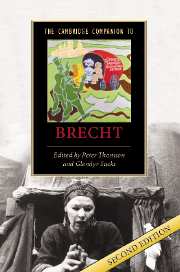Book contents
- Frontmatter
- Part I Context and Life
- Part II The Plays
- 4 Brecht’s early plays
- 5 The Threepenny Opera
- 6 Brecht’s clowns: Man is Man and after
- 7 Learning for a new society: the Lehrstück
- 8 The Good Person of Szechwan
- 9 Mother Courage and Her Children
- 10 Life of Galileo: between contemplation and the command to participate
- 11 The Caucasian Chalk Circle: the view from Europe
- Part III Theories and Practices
- Bibliography
- Index
- Series List
4 - Brecht’s early plays
from Part II - The Plays
Published online by Cambridge University Press: 28 March 2007
- Frontmatter
- Part I Context and Life
- Part II The Plays
- 4 Brecht’s early plays
- 5 The Threepenny Opera
- 6 Brecht’s clowns: Man is Man and after
- 7 Learning for a new society: the Lehrstück
- 8 The Good Person of Szechwan
- 9 Mother Courage and Her Children
- 10 Life of Galileo: between contemplation and the command to participate
- 11 The Caucasian Chalk Circle: the view from Europe
- Part III Theories and Practices
- Bibliography
- Index
- Series List
Summary
The period immediately after the First World War was a time of unprecedented upheaval throughout Germany, and nowhere more so than in Bavaria. After defeat in the war (for which the German propaganda machine had failed to prepare the public), and the abdication of the Kaiser, Germany experienced its abortive revolution, which included the establishment of a Soviet State of Bavaria. When this had been brutally suppressed (ironically by a socialist government in Berlin), the country staggered from crisis to crisis during the Weimar Republic until, eventually, Bavaria became the power base of the Nazi party. So, as he was setting out on his career as a writer, Brecht experienced, albeit indirectly, both fighting in the trenches of a world war and fighting on the streets during a failed revolution.
The sacrifices demanded of his generation during this period affected the young Brecht profoundly, encouraging in him a detached view of humankind, both individually and in society, and an enduring mistrust of all forms of idealism. It is against this turbulent background, and to give expression to these developing social and aesthetic attitudes that the (sometime medical student, sometime vituperative theatre critic) son of the manager of an Augsburg paper-mill wrote his first three full-length plays: Baal (1918-22), Drums in the Night (1919) and In the Jungle of the Cities (1921-4), an early draft of which was produced in Munich in 1923 under the original title, In the Jungle (Im Dickicht).
- Type
- Chapter
- Information
- The Cambridge Companion to Brecht , pp. 65 - 77Publisher: Cambridge University PressPrint publication year: 2006

